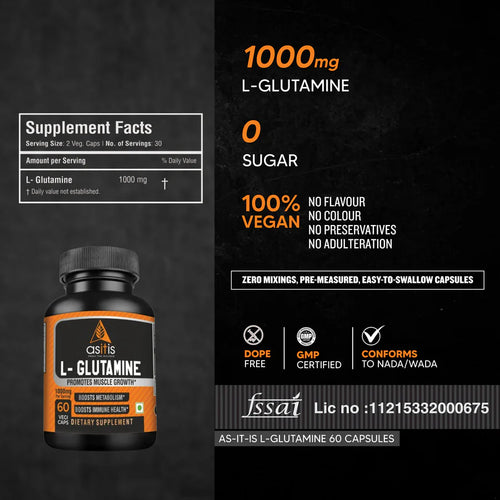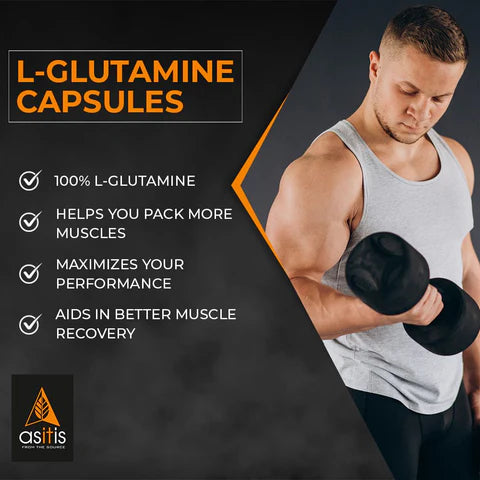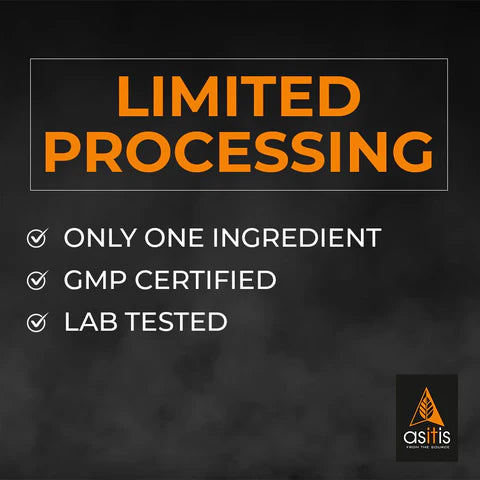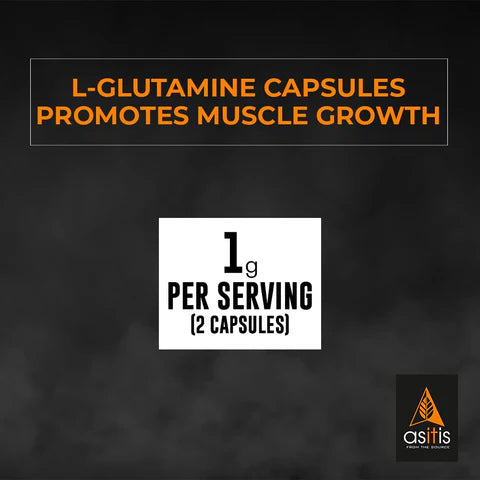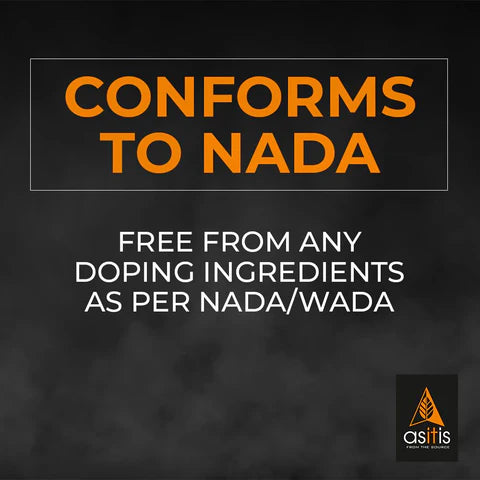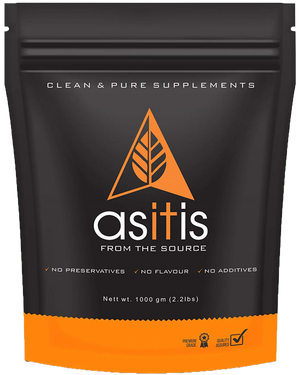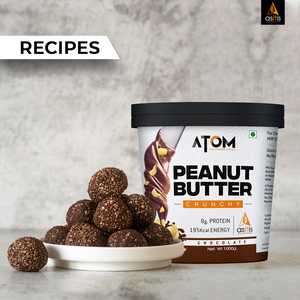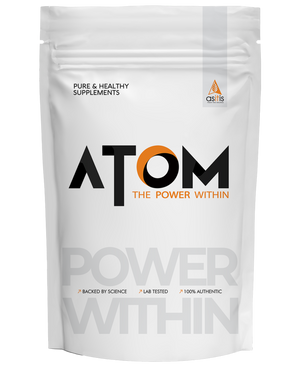L-Glutamine is the most prevalent (over 60% of skeletal muscle is made up of glutamine) amino acid in muscle tissue. Glutamine can be found in food items like meat, fish, dairy, legumes, cereals, and is available in supplement form as powders and capsules. Glutamine is a conditionally essential amino acid that fulfills many roles in the body. Glutamine is a widely used sports supplement that facilitates nitrogen metabolism, supports protein synthesis, maintains acid-base balance, is critical for immune response, gut health, glycogenesis, ammonia buffering, and energy production among others.
- I am a runner, should I use a glutamine supplement?
Runners will definitely benefit from glutamine supplementation. Running at high volume and intensity will end up causing muscle tears and some less desirable side effects like decreased immune function, digestive distress, and muscle fatigue. Glutamine supplementation helps replenish the depleted glycogen stores, aids in faster recovery of muscles, protects from GI distress, helps reduce inflammation, and offers protection to impairment of immune cells following prolonged, exhaustive running. Glutamine stores are lower after long-distance running, glutamine supplement helps attenuate this loss and facilitates both middle distance, and marathon running.
- I do home workouts, can I use glutamine?
Definitely yes, glutamine will give the fitness routine a boost, not only for bodybuilders and high-performance athletes but also for those who do home workouts. Supplementing with glutamine will allow your body to keep a high supply of glutamine in the muscles and prevent them from breaking down. Glutamine will help synthesize protein, build muscle mass, and significantly affect metabolism, gut barrier maintenance, and glucose formation. Glutamine prevents muscle wasting, increased susceptibility to infections, and increases exercise performance.
- Who can benefit from L-glutamine supplementation?
Glutamine is a fitness supplement that is suitable for bodybuilders, weight lifters, runners, those who do endurance workout, those who want to reduce muscle fatigue, improve recovery, it is suitable for men, women, and vegetarians. Those who want to improve gut health and immune health can also consider taking glutamine supplements.
- What are the benefits of L-glutamine?
Glutamine helps maintain high nitrogen balance in the muscles which prevents muscle breakdown, thereby retaining more muscles. Glutamine helps decrease muscle soreness through improved muscle repair and glycogen repletion. The biggest benefit of glutamine supplements come in their ability to restore the digestive tract while maintaining the integrity of the intestinal lining. Glutamine prevents ammonia accumulation, preserves glycogen stores, fuels your muscles by providing optimum hydration, and prevents the cortisol-induced breakdown of muscle protein.
- How to consume glutamine? Are there any side effects of glutamine?
5g of glutamine is the recommended dose for daily supplementation. Consuming this dosage helps replenish the amount of glutamine that has been used up during a workout. If it is glutamine powder, you can mix it up with water, fruit juice, protein shakes and consume. Make sure not to mix glutamine with hot fluids as the amino acid may be affected by temperature. With regard to side effects, glutamine is unlikely to cause any negative effects if you stick to the recommended dosage suggested on the supplement packaging. It is suggested to avoid excessive consumption of glutamine as this can lead to an upset stomach.
- What is the need to take glutamine supplements?
Our endogenous glutamine production may become inadequate during prolonged, intense exercise. Glutamine regulates protein synthesis, acts as an immune nutrient, helps speed up recovery, performs as a substrate for energy production. Not able to produce enough glutamine or replenish the stores quickly will inhibit its function, decrease muscle strength, stamina and lengthen the recovery period. Such times, our body tries to release more of this amino acid by breaking the protein store, leading to wasting of muscle tissue. The whole idea behind supplementing with glutamine is to restore its levels quickly in the body and optimize its useful functions in the body.
- What is the difference between glutamine & BCAA?
BCAA and glutamine are two of the most popular amino supplements in the fitness industry. Both supplements are extremely advantageous when it comes to building muscles, they have a unique role in the body and help you reach your fitness goals. Glutamine supplements provide your body with pure glutamine amino acid, whereas, BCAA supplements provide your body with 3 essential amino acids, leucine, isoleucine, and valine. While glutamine is more centered on maintaining positive nitrogen balance, preserving muscles, helping with cell hydration, and faster recovery, BCAAs promote faster muscle protein synthesis, muscle recovery, greater gains in muscle mass and improved performance.
- How does glutamine help reduce fatigue?
The depletion of energy source, over accumulation of protons in the muscle cell, muscle damage can cause muscle fatigue. Supplementing with glutamine works as a nutritional strategy for preventing this muscle fatigue. Glutamine is one of the most abundant glycogenic amino acids in humans which has a significant role in gluconeogenesis, glutamine acts as a direct stimulator of glycogen synthesis. Glutamine prevents muscle fatigue by preventing the accumulation of ammonia and by acting as an antioxidant.
- Can I take BCAA and glutamine together?
Yes, combining BCAA and glutamine supplements will promote performance and muscle gains. Combining the 2 supplements may not be beneficial unless you are training hard and undergoing intense muscle performance. An ability to generate anaerobic ATP continuously along with delaying fatigue will translate into better workouts and enhanced muscle mass. BCAA stimulates muscle protein synthesis, prevents muscle breakdown, and improves muscle power. Glutamine is essential to prevent immune suppression during an intense workout, it assists in muscle synthesis and faster recovery. If you are combining the 2 supplements, consider taking 2.5g of BCAA during workout and 5g of glutamine after a workout.
- What is the best time to take glutamine?
Since glutamine is the abundant amino acid in the skeletal muscle, every time you are working your muscles, you are depleting your glutamine stores. This means, the more intensely you train your muscles, the more glutamine will get depleted resulting in muscle fatigue. Since most people do not obtain sufficient glutamine through diet, many weightlifters and bodybuilders may not be getting the adequate amount of glutamine that their body requires to maximize performance. Considering the faster depletion of glutamine during a workout, and a need to replenish it faster, it is best suggested to take glutamine supplement post-workout. This prevents the body from breaking down muscle tissue to be used as energy and will allow you to maintain more lean muscle mass.
- Is glutamine used for gaining height?
Glutamine is essentially a muscle recovery supplement which helps your repair the wear and tear of muscles after an intense workout. During prolonged, exhaustive exercises, the endogenous synthesis of glutamine might not be sufficient to meet the body demand, and glutamine deficiency occurs. Glutamine supplementation aims to minimize ammonia production, regulate protein synthesis, energy production, maintenance of acid-base balance, prevents muscle loss, metabolic and immune stress.
- Can I combine glutamine with whey?
Yes, that’s in fact a wonderful combination of supplements you can consider for your performance. While Whey is a high-quality, convenient, highly bioavailable protein source that comprises all the essential amino acids, glutamine is an amino acid precursor to protein synthesis and energy production. During your intense workout, your body requires more glutamine than it is able to produce, which is the perfect reason for you to replenish it after a workout. Combining glutamine with Whey will serve as an effective way to replenish the lost protein, fight fatigue, repair muscle damage, and maintain an anabolic state while also fighting the immune health damage.
- Does glutamine support cutting?
Yes. Glutamine is a nitrogen compound, it drives nitrogen to the muscles and creates an anabolic environment (anabolic state). Cutting involves burning fat while preserving muscles, when you do HIIT cardio in the calorie-deficit state to achieve this, your body will burn some muscles along with fat. During the cutting phase, a combination of glutamine with Whey instead of glutamine alone would be most beneficial in maintaining the anabolic state, preserving your hard-earned muscles while also building new muscle tissue. While Whey is a fast-digesting protein, glutamine in glutamine supplement is in free form and rapidly enters the bloodstream to preserve muscles during the cutting phase.
- I am already taking whey, if I add glutamine, then at what time should I take both?
The best time to take glutamine would be when glutamine stores run low within the body. This would be mostly after your intense workout. Whey with its full range of essential amino acids is most ideal to be consumed during the anabolic window (within 30 minutes to one hour after your workout). During this period, your muscle will be more receptive to amino acids, consuming the combination at this time will improve your recovery times, gets you ready for your next session.
- What is the difference between creatine & glutamine? When can I take both?
Glutamine and Creatine are well-researched and proven amino workout supplements. Both glutamine and creatine work to promote muscle growth, reduce muscle fatigue and muscle soreness.With Creatine, you can expect boosted energy to up your performance levels, bigger gains, reduced fatigue, improved stamina for high-intensity performance.With glutamine, you can expect a faster recovery of muscles, improved gut motility, immune function, reduced fatigue, and improved performance.The conventional wisdom is to take creatine before a workout due to its ability to generate the potential ATP required to boost intense performance. Glutamine is well suggested to be taken after your workout as it tends to repair and recover muscles and increase metabolic activity.
.
- Does glutamine support weight loss or weight gain?
Glutamine may not be the supplement you should be looking for particular benefits of weight loss or bulking. However, combining glutamine with Whey may favour the benefits of weight loss through increasing lean muscle tissue.
There is no evidence to prove glutamine encourages weight gain, as it only affects lean muscle, not fat reserves. Taking glutamine alone will not add to the high-caloric needs of your body, you can combine it with a mass gainer supplement or pure carb for weight gain results.
- Does glutamine help prevent the breakdown of muscles?
Yes. There is a consistent body of evidence that prolonged exercise causes an elevation in plasma cortisol levels. This stimulates protein breakdown. Prolonged exercise decreases glutamine release by skeletal muscle due to the increased rate of glutamine uptake by other organs. By acting as a nitrogen donor, glutamine increases positive nitrogen balance which can result in attenuation of exercise-induced muscle damage, muscle soreness and loss of muscle. Glutamine helps to replenish the glycogen stores, supports the repair and regeneration of all muscle tissue.
- How does glutamine protect immune health?
Your intense exercise is associated with a negative impact on immune function. The chances of immune suppression are more if you are doing a workout in a carbohydrate-depleted state, experience an increase in the stress hormone, and a greater exertion on immune health. Strenuous exercise may compromise the total glutamine pool, resulting in impaired immune function. Supplemental glutamine helps prevent immune suppression by slowing down the body’s release of cortisol and maintenance of optimal antioxidant status.
Click On The Links Below For More Information On Glutamine
Must To Know Top 10 Benefits Of Glutamine
Effect Of Glutamine On Muscle Recovery
Why Should You Supplement With Glutamine?
BCAA Vs Glutamine
How Does Glutamine Reduce Muscle Fatigue?
How Does Glutamine Prevent Muscle Damage?
Combination Of Whey & Glutamine
Glutamine Is Excellent For cutting
How Does Glutamine Prevent Muscle Wasting?
